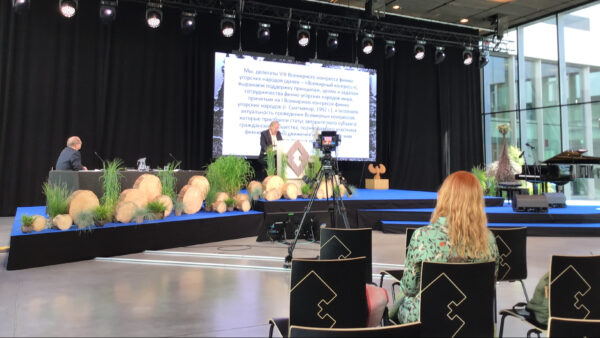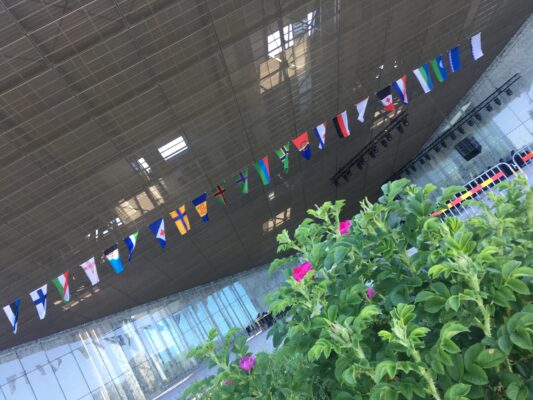
Resolution 2000
Resolution of III World Congress of Finno-Ugric Peoples
Resolution of III World Congress of Finno-Ugric Peoples
In today’s world, the Finno-Ugric community has formed itself as a force, which can express and protect the values and ideals common to all humanity, that is:
- Preservation of the priceless historical and cultural heritage of all peoples for future generations;
- Harmonious combination of the development of civilisation and traditional folk spirituality;
- Raising the young generation in the spirit of respect and love in regard to the historical heritage of their ancestors.
Since the time of the I (Syktyvkar) and the II (Budapest) World Congresses of Finno-Ugric Peoples, some significant changes have taken place and are still continuing inside the Finno-Ugric world itself, namely:
- the Finno-Ugric world has became a real factor, consolidating our peoples and playing an even more constructive role in the sphere of relations between the states;
- the development of all-round relations has led to the rapprochement of Finno-Ugric peoples. Most clearly it manifests itself in the spiritual sphere: in culture, education, and science; there is deeper understanding of all the things in common that bring our peoples closer together;
- our peoples have acquired the experience of solving vitally important issues of self-determination in the process of dialogue with and participation of all the stakeholders – both governmental bodies and non-governmental organisations involved in the process;
- special attention has been paid to the processes of reviving and developing cultures and languages, and to national self-consciousness of Finno-Ugric peoples; systems of national education are being expanded; mass-media is being developed; the number of Finno-Ugric languages, which are protected by law, is increasing;
- the Consultative Committee of Finno-Ugric Peoples has become the co-ordinating centre of the Finno-Ugric community and has managed to create a broad network of relations with different governmental and non-governmental organisations that makes it possible, in particular, to protect the rights of indigenous people and linguistic minorities through assistance rendered by international structures.
Current tendencies at the global and European levels are generally positive, enabling ethnic minorities and indigenous peoples to implement their rights. Noteworthy in this context are certain regional legal instruments: the Framework Convention on the protection of ethnic minorities’ rights (1992); the Chart of the Council of Europe on regional languages and languages of ethnic minorities (Strasbourg, 1992); Convention No. 169 of the International Labour Organisation. The Congress appeals to all the States where Finno-Ugric people live traditionally to ratify those documents.
At the same time, during recent years, in some regions of traditional residence of Finno-Ugric peoples, one can observe the deterioration of their social and economic conditions, which, in its turn, has a negative impact on the general situation, reproductive factors and self-development of these peoples. The problems of demographic development are especially serious. Due to certain unfavourable processes (assimilation, negative natural increase of population, etc.), the absolute number of some peoples is decreasing.
The matters concerning protection and development of Finno-Ugric languages must be given more support and encouragement. People who forget their language, eventually, are assimilated by and absorbed into the dominating cultural milieu. Today, there are few Finno-Ugric diasporas which are able to develop or, moreover, modernise their culture just in their own communities, being separated from the ethnic cores of their ancestral homelands.
With the objective of further all-round development of related peoples, the III World Congress of Finno-Ugric peoples hereby resolves:
- I. To assist all Finno-Ugric peoples to exercise their right to self-determination in accordance with generally recognised international norms and principles, taking into consideration the opportunities and status of each nation existing in reality.
- II. To contribute to and facilitate the development of living cultural traditions and traditional world-outlooks, the creation of modern urban cultures of related peoples, new approaches and methods enabling to combine the traditional spirituality with modern forms of perceiving the surrounding reality of life by the younger generation of Finno-Ugric peoples, aiming to resolve the problems of bringing up the young people and to create proper conditions for their physical, mental and spiritual health, through their introduction to the traditions, culture and languages of the Finno-Ugric peoples.
- III. Based on the principle that every human being has the right to get education in its own mother tongue, it is necessary to continue to support the establishment of educational facilities which apply mother tongue in the educational process (from basic to higher) and to expand their educational opportunities. Having this objective in mind, it is necessary to develop the terminological basis of the language, to assist in elaborating and publishing of educational materials in the mother tongue as well as to train teachers. In order to increase the survivability of the language – to insist on its application in all spheres of communication, including electronic and traditional mass media. To support the return of the mother tongue to the family life and to the youth community.
- IV. To pay special attention to the issues of developing the cultures and languages among the diasporas of Finno-Ugric peoples, because each of them is an integral part of the historical and cultural heritage common to the entire national community.
- V. To carry out series of scientific investigations aimed at the study of the conditions of and the environmental influences on people’s health, the conditions conducive to population reproduction and family problems in the areas where Finno-Ugric peoples reside compactly.
- VI. To continue the work on the further improvement of state legislation in the field of indigenous peoples’ rights, including the rights of numerously-small peoples, as well as national minorities. To strive to pass special acts, which will secure the legal status of these peoples and their representative bodies in socio-political and governmental structures, will protect the territories they inhabit, as well as will safeguard the social, economic and cultural basis of their existence and development.
- VII. The Consultative Committee should support the adoption of the Declaration of Rights of Indigenous People, elaborated by the UN.
- VIII. To ask Hungary, the Russian Federation, Finland and Estonia to initiate together the process of declaring the Decade of Finno-Ugric Peoples.
- IX. To declare the Saturday of the third week of October as the Day of Related Finno-Ugric Peoples.
- X. The Consultative Committee of Finno-Ugric Peoples must play a co-ordinating role in the process of implementation of the current Resolution.
Helsinki, December 13, 2000


